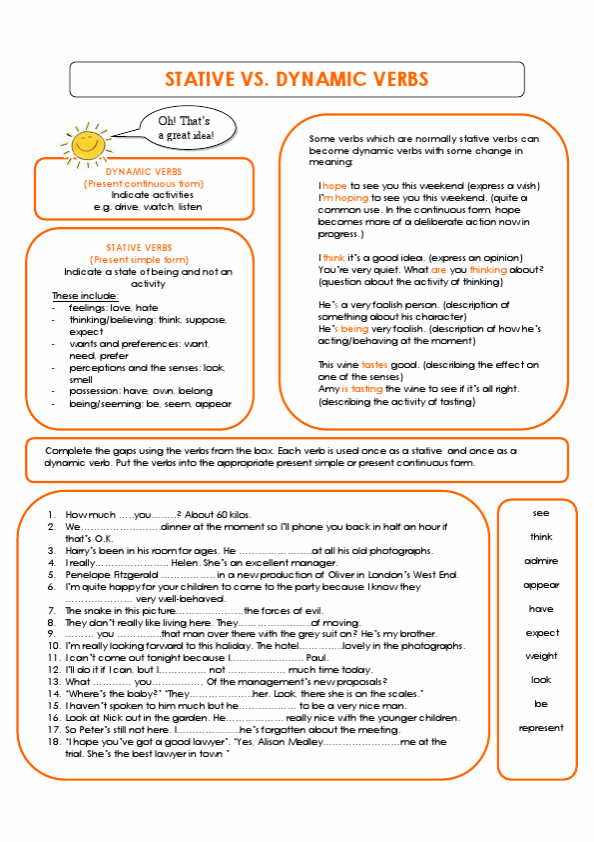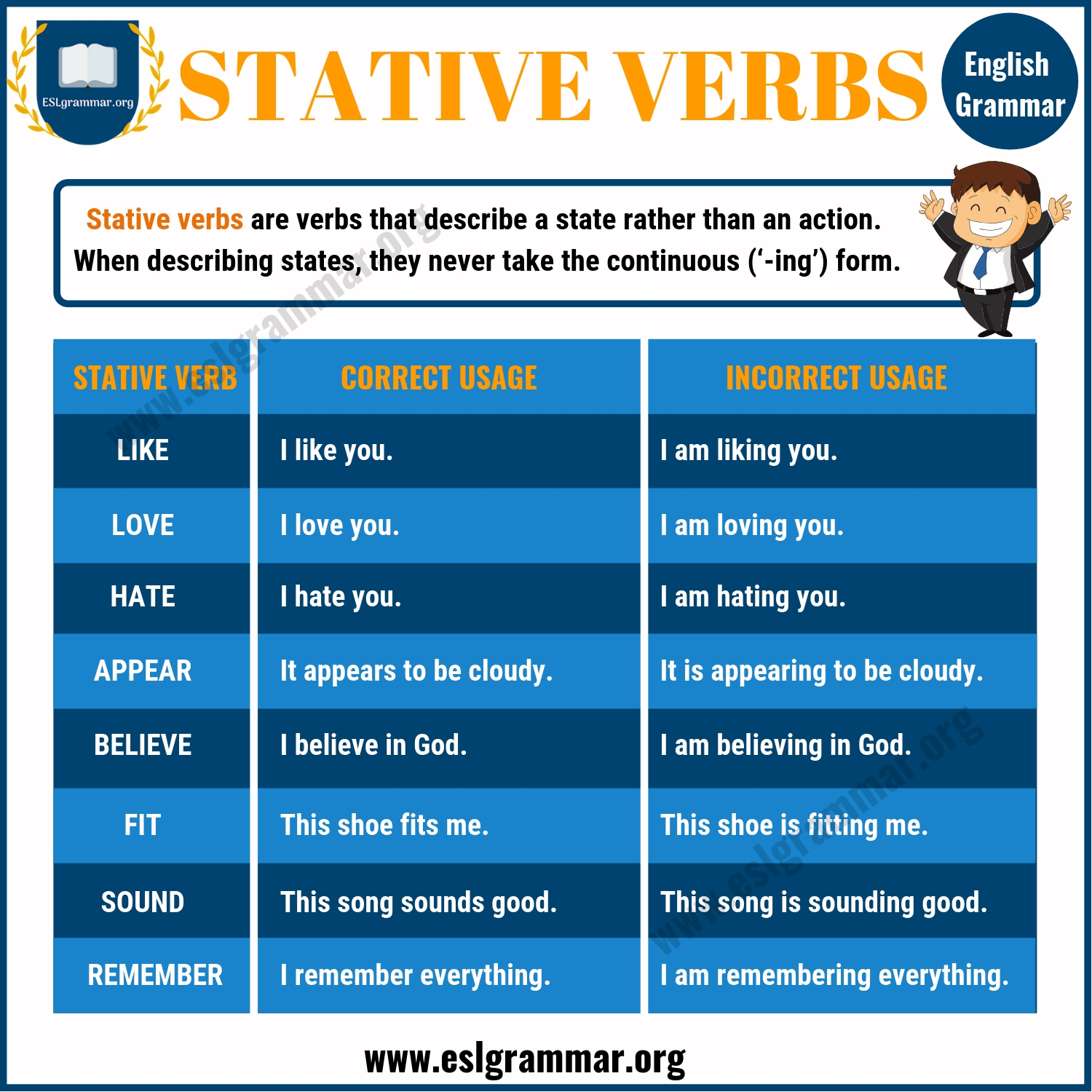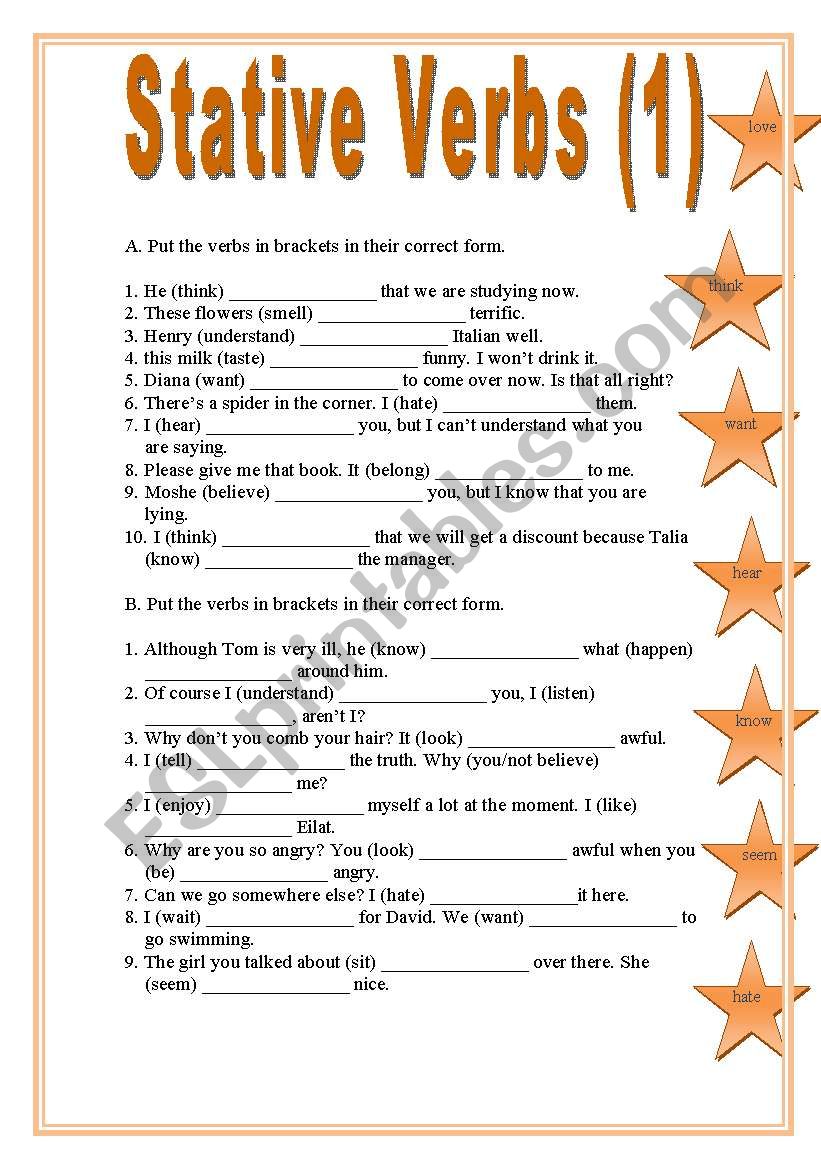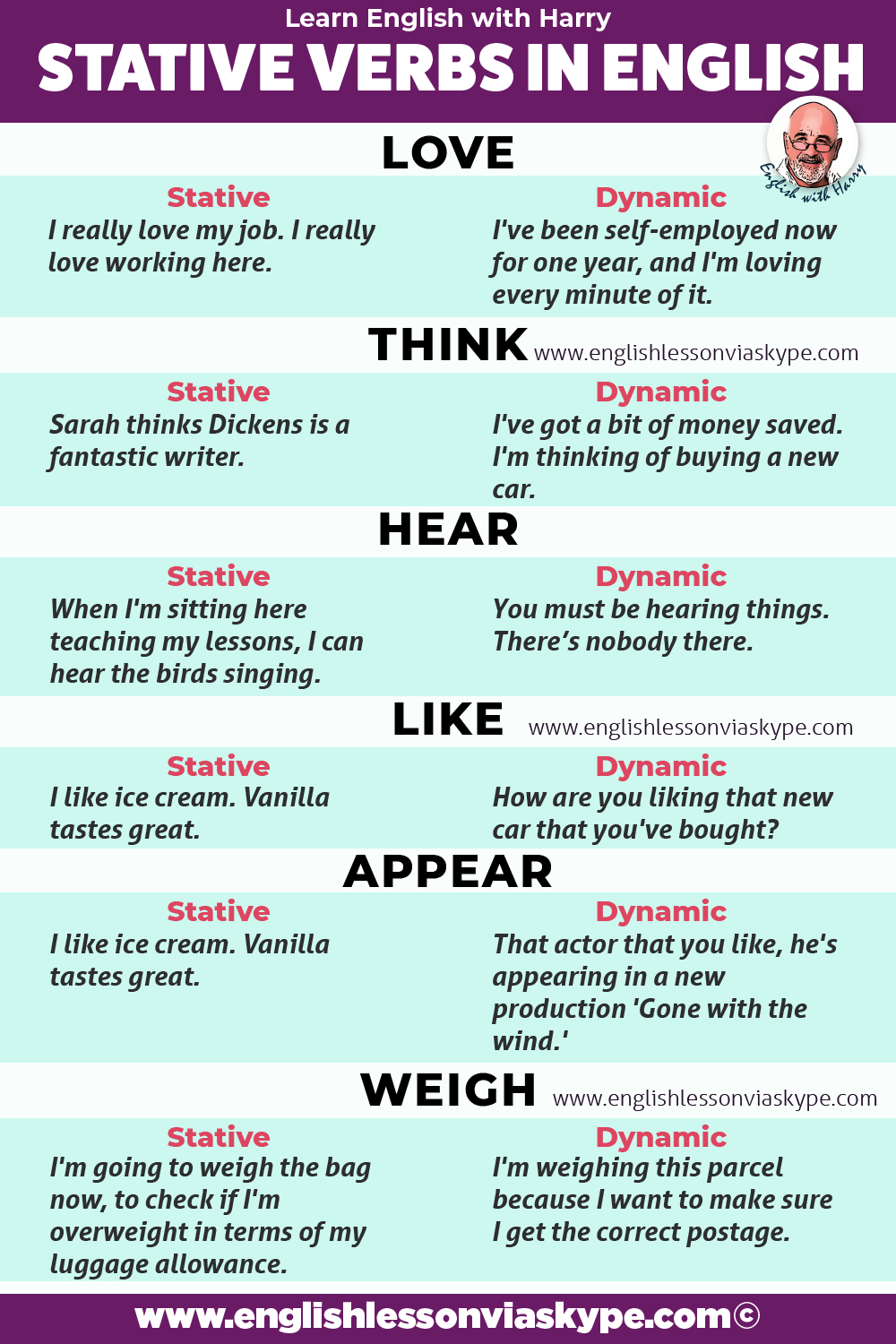
Stative verbs worksheet Verb worksheets, Verb, Grammar worksheets
a) remember - Wrong - this is usually a stative verb but here it means the action of thinking of a specific memory. b) remembering - Correct - this is usually a stative verb but here it means the action of thinking of a specific memory. c) remembers - Wrong - you use 'remembers' with 'he', 'she' or 'it'.

English grammar, Grammar and English on Pinterest
GRAMMAR: Stative Verbs Exercise (1) Circle the correct form of the verbs in parentheses. Right now they (think, are thinking) about buying a new car. Pete (has been knowing, has known) Jane for many years. the theatre. It (is depending, depends) on what the weather (is being, is) like on the weekend. (f) Pierre (has owned, has been owning) that.

Stative Verbs Elementary Exercises Verbs Worksheet
Action verbs describe physical actions. They can be used in both simple and continuous forms. Stative verbs describe the state or quality of something. They are not actions. They are mostly used in the simple form. Some verbs can be both action and stative verbs, depending on the context they are used in.

Stative Verb Exercises English ESL worksheets pdf & doc
How to use stative (state) and dynamic verbs. Download a complete list of stative verbs with lots of examples in PDF here; Try an exercise about stative verbs here; Some English verbs, which we call state, non-continuous or stative verbs, aren't used in continuous tenses (like the present continuous, or the future continuous). These verbs often.

Stative verbs online worksheet for teenager, adults. You can do the
9794. 78. 83. 0. 1/1. Let's do English ESL general grammar practice. Present Simple or Present Continuous Stative Verbs. This worksheet is meant for grammar practice.

Stative Verbs Exercises Free Printable Stative Verbs ESL Worksheets
State or stative verbs are verbs which do not usually have continuous tenses because they describe a state rather than an action. Some state verbs have continuous tenses, but there is A DIFFERENCE IN MEANING. Students revise the most common state verbs and complete the sentences using either the present simple or the present continuous. Key provided.

Stative Verbs or Dynamic Verbs ESL Grammar Worksheet Verbs esl, Verb
STATIVE VERBS know hate hear smell* remember mean understand believe like have* weigh* taste* owe want own* prefer *Some verbs (such as *these) can be either 'stative' or 'dynamic', depending on their usage. Complete the sentences below. Use the words in the box. 1. My friend _____ a pet dog. 2.

STATIVE VERBS worksheet Verb, Learn english, English grammar
Exercises. I'm not understanding the question. understand is a verb related to the mind → present simple. I can see land on the horizon. I'm hating this song, change it. hate is a verb related to feelings → present simple. What are you preferring?

2 simple exercises that were created to help students understand the
STATIVE VERBS. ENGLISH day B2 EXAM PRACTICE 1 Complete the second sentence so that it has a similar meaning to the first sentence, using the word given. Do not change the word given. You must use between two and five words, including the word given. 1Bethany and William might move house next year.

Stative Verbs Definition and Useful Examples in English ESL Grammar
Try this exercise to test your grammar. Grammar test 1. Stative verbs: Grammar test 1. Read the explanation to learn more. Grammar explanation. Stative verbs describe a state rather than an action. They aren't usually used in the present continuous form. I don't know the answer. I'm not knowing the answer.

Stative verbs online exercise for 7. You can do the exercises online or
LEVENT SCHOOLS INT. LEVENT LANGUAGE STUDIO SRLS. Via Amalfi 35, TREVISO piva 047 41960266 Tel. 347 42 58 840 [email protected]. WWW.LEVENTSCHOOL.COM. LESSON 6.1 STATIVE VERBS (EXTRA EXERCISES WITH ANSWERS. Choose the present simple or present continuous (these verbs are sometimes stative): 1.

Stative Verbs Worksheet
button below! Grammar Worksheet Stative Verbs. Complete the 16 sentences by using the words in the box. ANSWER KEY and percentage conversion chart on Page 2. Intermediate to Advanced Level. Approximately 15 minutes. . Download the PDF file by clicking on the gold.

Presentation of stative verbs and verbs with both a stative and a
Stative verbs, also known as non-action or non-continuous verbs, describe a state of being or a condition that is ongoing or permanent. Unlike action verbs, stative verbs do not describe an action that is happening at a specific moment in time. Examples of stative verbs include "be," "feel," "think," "like," "love," "hate," and "believe." An.

the worksheet for an argument is shown in black and white, with text on it
The Flatmates - Language point - Stative verbs. Stative (or state) verbs describe states (things that don't change easily or quickly, for example, what you believe, think or own) rather than actions (jump, talk or buy). Stative verbs are not normally used in the continuous form (ing).

Stative Verbs (1) ESL worksheet by anatavner
Stative Verbs 1. Choose the present simple or present continuous. This exercise includes the verbs see, think, have, be, and taste, which are sometimes stative. 1) My husband (always/taste) the food while I'm cooking! It's very annoying. [ . ] Check. Show.

Ausführlich Perfervid Viva is look a stative verb Stapel Emotion Boden
Not all verbs express actions. Some verbs that indicate a state of being or a condition are called stative verbs. Discover the meaning, rules, and examples of stative verbs in sentences. Then, answer the three stative verb worksheets and grammar exercise tests with a printable PDF to test your understanding.